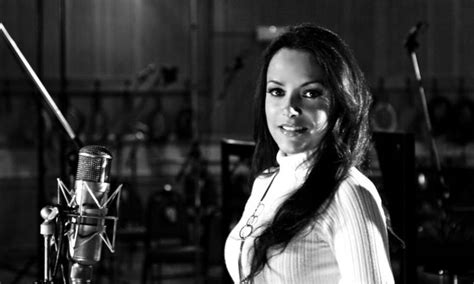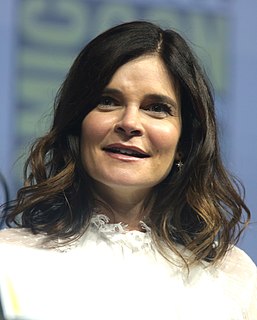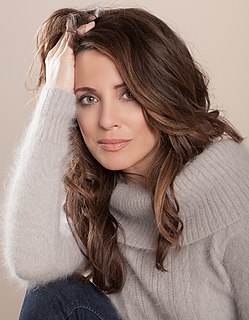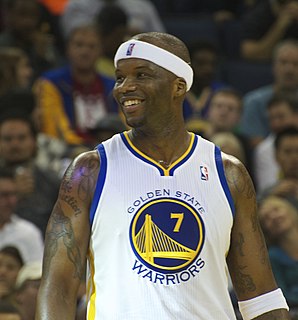A Quote by Cecelia Ahern
There was a magic about the sea. People were drawn to it. People wanted to love by it, swim in it, play in it, look at it. It was a living thing that was as unpredictable as a great stage actor: it could be calm and welcoming, opening its arms to embrace it's audience one moment, but then could explode with its stormy tempers, flinging people around, wanting them out, attacking coastlines, breaking down islands.
Related Quotes
I do get stressed at times, but I love what I do as an actor. This is the part that I don't like. I don't actually like talking about - I wish I could just go and get on with my job, because I love getting a script, breaking it down, working with other people, bonding with other people, fighting with other people, and out of those arguments, creating something that nobody expected and seeing it all come together. Telling a story, having an impact on people's lives, moving them and making them laugh.
Mere opinions, in fact, were as likely to govern people's actions as hard evidence, and were subject to sudden reversals as hard evidence could never be. So the Galapagos Islands could be hell in one moment and heaven in the next, and Julius Caesar could be a statesman in one moment and a butcher in the next, and Ecuadorian paper money could be traded for food, shelter, and clothing in one moment and line the bottom of a birdcage in the next, and the universe could be created by God Almighty in one moment and by a big explosion in the next--and on and on.
I fell in love with the classical crossover genre when I was on AGT. I found out that I could use the microphone to establish a deeper intimacy with the audience. I did not portray an opera character; I was my true self. I would sing a four-to-five minute piece for the audience and then I could talk to them and say "Hi" to them! I would not need to act out scenes where my character was dying from tuberculosis or killing somebody else on stage, I could have a nice conversation with them.
I wrapped my arms around me as tightly as I could, and stared up at the stars. Had I not been so cold and wanting to escape so badly, I could have stared at them forever: They were amazingly beautiful, so dense and bright. My eyes could get lost up there if I left them looking long enough. [...] They swallowed me up. They were like a hundred thousand tiny candles, sending out hope.
I got on stage and I went, "Oh wow. No stage fright." I couldn't do public speaking, and I couldn't play the piano in front of people, but I could act. I found that being on stage, I felt, "This is home." I felt an immediate right thing, and the exchange between the audience and the actors on stage was so fulfilling. I just went, "That is the conversation I want to have."
When you're doing comedy on stage, it's great because you have the audience there and they're like another actor in the scene. You feed off of them, laugh. But in film when everyone's quiet, it's all about timing. But the key to that is to be authentic. Be in the moment, and if you play the moment truthfully, the humor will be there.
I was skating with friends in my neighborhood, and then eventually I was invited to go to the skate park with one of them. When I saw people flying all around - literally flying in and out of bowls - that is when I knew I wanted to do it. I wanted to figure out how I could get there and how I could fly.
My falling in love with spoken word poetry definitely came out of that time period where all the adults around me were failing to supply me with any answers. Everyone was too busy dealing with things that were more important. I was pretty lost and invisible. And all of a sudden, this world opened up where I could get on stage and perform in front of my peers. People would listen to me and see me, and people would say, "That thing you created was important." And that was so validating and necessary at that specific moment.
I always tried to make people laugh. I attribute that to - I come from a family of divorce. It was a way to distract myself from stuff. I always thought it was interesting that my brother and I existed in this really tight bond, and we would just take the piss out of pretty much everything. I knew I wanted to be an actor so it would be great if I could make people laugh while I was doing this, because I could be other characters and other people, and I could hide behind things. It was a great out for me, and a mode of expression.
Unfortunately, we are a society that does look down on divorce when, ironically, there are more single divorced people in the world right now. So, the fact of the matter is that it's a reality, and more people should obviously embrace wanting to change, wanting to move on from a relationship that just no longer works for them.
It's a huge, huge pressure that so many people depend on you. The type of player I am and people look at me to come out and perform a certain way. Not being able to play on the biggest stage of the season, it's frustrating. One thing I wanted to do was not be frustrated about it and figure out what I can do to change and better myself on the court.
If you're not connected emotionally to a story, then you're dead. You're as a filmmaker really just opening the door for people to lose interest and their minds to wander, for them to start picking it apart. That's what people will do, people will naturally tear stuff apart because they're trapped with it, they paid money for it. And they came into it wanting to love it. So all you can really do is piss off the audience. Unless you do things right.
I've always had great satisfaction out of writing the plays. I've not always had great satisfaction out of seeing them produced-although often I've had satisfaction there. When things go well in production, on opening there's no nicer feeling in the world-what could be nicer than watching an audience respond? You can't that from a book. It's a fine feeling to walk into the theater and see living people respond to something you've done.







































